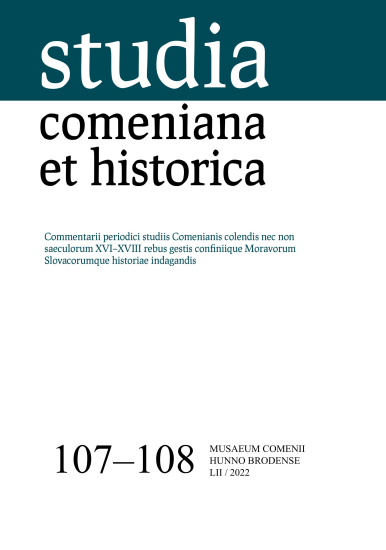STUDIA COMENIANA ET HISTORICA
You are welcome to send in your contributions for the issue No. 109–110 LIII/2023.
Deadline: December 31, 2024.
Current issue
Studia Comeniana et historica 107–108 LII/2022
 |
Havelka Tomáš, To Disappear and Lose Oneself by One’s Own Will and Reason. On the Concept of Spiritual Resignation in Comenius’ Work | summary
Michalík Jiří, Comenius’ Labyrinths: The Rosicrucian Labyrinth | summary
Nejeschleba Tomáš and Whittaker Dominik, The Labyrinth of Medicine and Medical Reform as a Way Out: Comenius and the Philosophy of Medicine | summary
Kis Tímea N., Comenius’ Path in the Labyrinth of Words. Uniqueness of the Author’s Written Heritage in The Labyrinth of the World and the Paradise of the Heart | summary
Hubková Jana, The Symbolism of the Labyrinth in Pamphlet Journalism in Comenius’ Time | summary
Sohma Shinichi, The Pedagogical Implications of the Labyrinth in Comenius | summary
Éger Gábor, Comenius’ Influence on School Plays: István Eszéki’s Ritmusokkal való szent beszélgetés (Holy Conversation in Rhymes) | summary Kovács Áron, The Beginnings of Comenius’ Remembrance in Sárospatak | summary
Ugrai János, Comenius’ Absence from Pedagogical Discourse in Sárospatak in the First Half of the 19th Century | summary
Malura Jan, Disasters, War, Melancholy in the Consolatory and Religious Educational Literature of the First Quarter of the 17th Century | summary
Hrdinová Eva Maria, Divine and Secular Wisdom in the Works of J. A. Comenius | summary
Soleiman pour Hashemi Michaela, Comenius’ Labyrinth and His Theseus: Notes to the Manual | summary
Červenka Jan, Dialogues Lost in the Labyrinths of 16th-Century Literature | summary
Wąsowski Mateusz, The Eternal Labyrinth – John Amos Comenius and Fyodor Dostoevsky | summary
Rýdl Karel, Comenius’ Concept of Knowledge as the Inspiration for Changes of the School Curriculum | summary
|
You can buy the journal in our e-shop.
Contact: pospisilova@mjakub.cz



